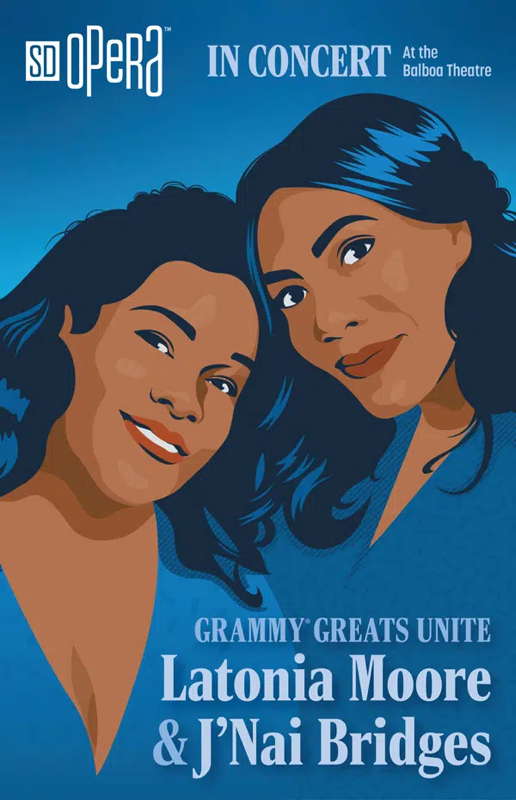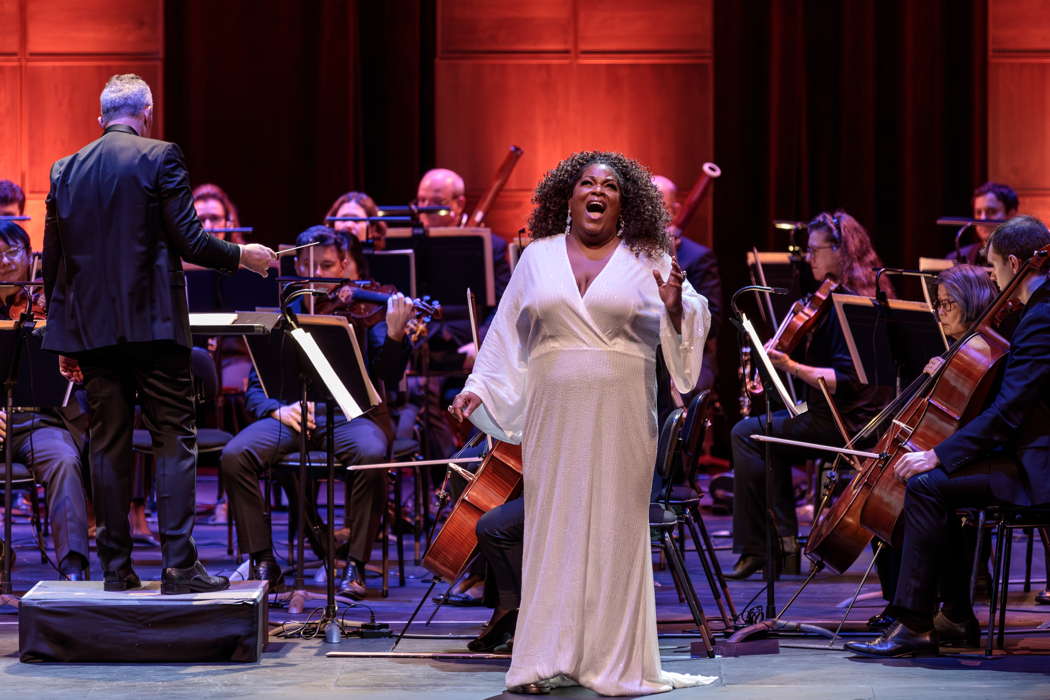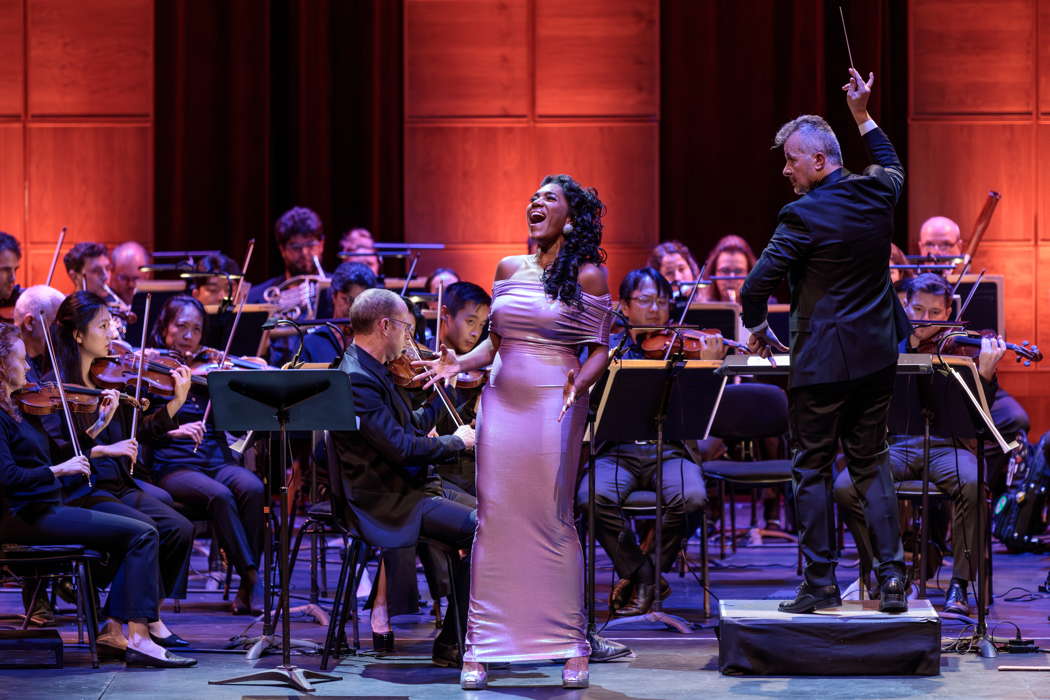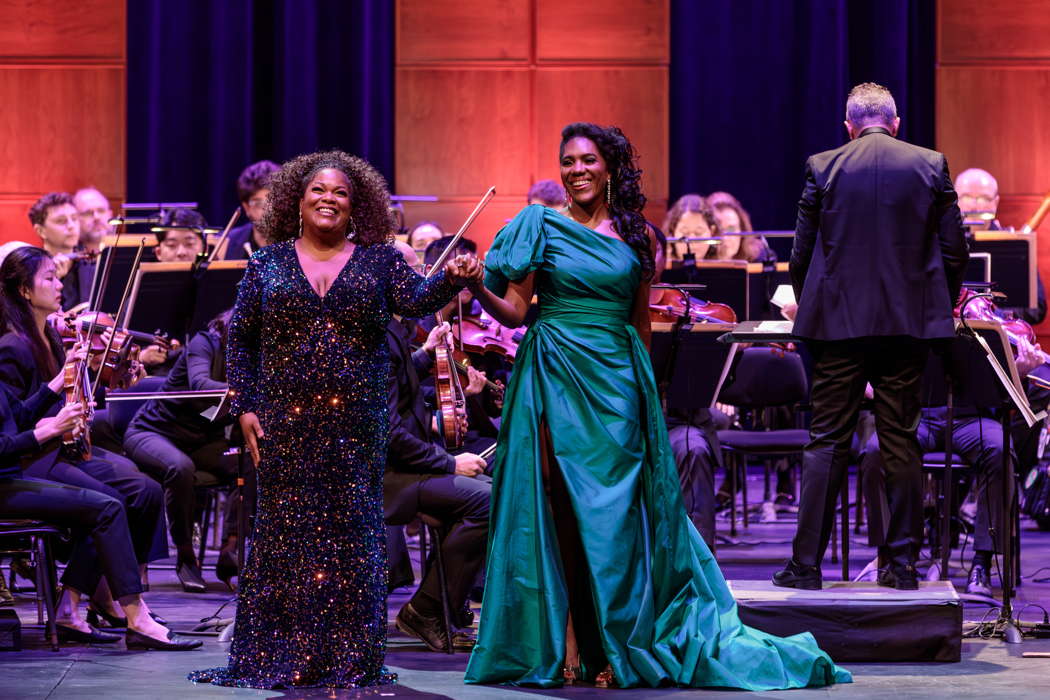 VIDEO INTERVIEW: Ona Jarmalavičiūtė talks to American choral conductor Donald Nally, director of The Crossing, in this fascinating, illustrated, one hour programme.
VIDEO INTERVIEW: Ona Jarmalavičiūtė talks to American choral conductor Donald Nally, director of The Crossing, in this fascinating, illustrated, one hour programme.
- Kleos Classics
- Anna Isahaki Papazyan
- Juan Orrego-Salas
- Vyacheslav Nagovitsin
- Judith Bingham
- Wilhelm Furtwängler
- David Angel
- Malcolm Goldring: The Infant King
 CENTRAL ENGLAND: Mike Wheeler's concert reviews from Nottingham and Derbyshire feature high profile artists on the UK circuit - often quite early on their tours.
CENTRAL ENGLAND: Mike Wheeler's concert reviews from Nottingham and Derbyshire feature high profile artists on the UK circuit - often quite early on their tours.
Thoroughly Enjoyable
RON BIERMAN listens to a concert given by Latonia Moore and J'Nai Bridges, with the San Diego Symphony Orchestra and conductor Bruce Stasyna
San Diego Opera's opening for this season featured the high-powered singing and emotional depths of soprano Latonia Moore and mezzo-soprano J'Nai Bridges. The duo's more than capable backing was provided by a near full complement of the San Diego Symphony conducted by Bruce Stasyna.
Stasyna is the Resident Conductor and Chorus Master for San Diego Opera and has been on the conducting rosters of the New York City and Boston Lyric Operas. He conducts with vigorous authority. The orchestra opened the concert with a fleet reading of the bubbly overture from The Marriage of Figaro and later returned for a regal-sounding 'Polonaise' from Eugene Onegin.

Poster for San Diego Opera's
Grammy Greats Unite concert
Soprano Moore came to the stage first with 'Allora rinforzo i stridi miei ... Or sai chi l'onore' from Mozart's Don Giovanni.
The relatively long aria brought immediate attention to her seemingly effortless power and soaring sustained high notes.

Soprano Latonia Moore with Bruce Stasyna and the San Diego Symphony Orchestra at the Grammy Greats Unite concert.
Photo © 2023 Karli Cadel
Mezzo-soprano J'Nai Bridges chose the seductive 'Mon cœur s'ouvre à ta voix' from Samson and Delilah by Saint-Saëns for her first aria.

Mezzo J'Nai Bridges at the Grammy Greats Unite concert. Photo © 2023 Karli Cadel
The clip below is from a recital she sang in 2020. The piece shows her range, dynamic control and plush sound. The impact was amplified with the San Diego Symphony backing her.
Listen — Saint-Saëns: Mon cœur s'ouvre à ta voix (Samson et Dalila)
Excerpt from live 2020 recital by J'Nai Bridges and Conrad Tao:
That aria is one of many that have inspired pop songs. Its main melody was transformed to a Jackie Wilson hit recording of 'Night' many years ago. Rachmaninov is my favorite composer as a source of pop tunes. Try this extended version of 'All by Myself' by singer-songwriter Eric Carmen as it transforms - purists might say 'disfigures' - Rachmaninov's second piano concerto.
Listen — Eric Carmen / Rachmaninov: All by Myself
© 1975 Arista Records:
But wait, where was I? ...
Moore and Bridges combined for their first duet in 'Scuoti quella fronda di ciliegio' from Madame Butterfly. 'Poor Butterfly' - think Sarah Vaughn - shares excited anticipation of her unfaithful American lover's return with her maidservant Suzuki. The aria, written for soprano and mezzo, was a convincing way to show how well Moore and Bridges blended and how much they seemed to enjoy doing it.
'L'altra notte in fondo al mare' from Arrigo Boito's Mefistofele, his only finished opera as a composer, was another of Moore's choices. It was based on Verdi's Faust, for which Boito had written the libretto. The aria has been described as the best you've never heard, and it may be.
Listen — Arrigo Boito: L'altra notte in fondo al mare (Mefistofele)
Maria Callas, Philharmonia Orchestra / Tullio Serafin
Watford Town Hall, UK, 1975:
Now that you've dried your tears ...
Moore too brought tragedy to her interpretation, but the power, dynamic control and range she displayed are more likely the main reasons she debuted at the Met as Aida in 2012.
Mezzo-soprano Bridges made her debut at the Met in 2019 as Nefertiti in Philip Glass's Akhnaten. Its recording won a Grammy. The role of Nefertiti is for a contralto rather than mezzo, and her voice is rich and agile over her extended range. She followed her co-star, also a Grammy winner, with 'My Man's Gone Now' from Gershwin's Porgy and Bess.
The ninety-minute concert had only a quick pause for a costume change from two stunning form-fitting full-length dresses to two even more stunning. Moore went from glittering white to glittering night-sky dark; Bridges was in solid colors, going from a gorgeous lilac to a soft green, with a long slit that made her operatic expressions of love even more compelling.

Soprano Latonia Moore (left) and mezzo J'Nai Bridges at the Grammy Greats Unite concert. Photo © 2023 Karli Cadel
The short break also allowed time to roll a piano out to the side of the stage. The original program's 'La vie en rose' had been replaced by an aria from jazz-trumpeter and composer Terence Blanchard's opera Fire Shut Up In My Bones, the first opera by a black composer to be performed at the Metropolitan Opera. Moore received excellent reviews as Billie, one of the leads. A recorded performance of the Met's production won her a Grammy. She was accompanied by Stasyna, who often appears as an accompanist in operatic recitals.
The night of two orchestral pieces, four duets and nine arias and songs was a thoroughly enjoyable one for those familiar with operatic singing and repertoire. It would have been a better introduction to opera for newcomers attracted to a concert by Grammy winners if it had displayed supertitles, and the singers had pampered a bit by including a few more of the best known hits such as 'O mio babbino caro' or 'Un bel dì vedremo' by Puccini. Renée Fleming lists her top six as follows:
Puccini: 'O mio babbino caro' (Gianni Schicchi)
Puccini: 'Un bel dì vedremo' (Madama Butterfly)
Puccini: 'Vissi d'arte' (Tosca)
Richard Strauss: finale (Arabella)
Richard Strauss: Final trio (Der Rosenkavalier)
Korngold: 'Marietta's Lied' (Die Tote Stadt)
Quibbles aside, a good start for the new season.
Copyright © 3 November 2023
Ron Bierman,
San Diego, USA



